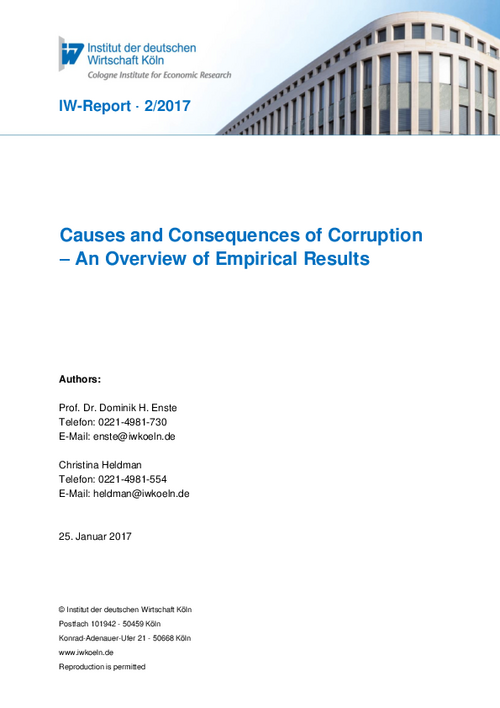Corruption is a main threat in many countries around the world. Therefore, the causes and consequences of corruption are analyzed in various empirical studies. Since the results are quite mixed, we have summarized the findings of the central empirical literature from the last two decades for a comprehensive overview.

Causes and Consequences of Corruption: An Overview of Empirical Results
IW-Report

Corruption is a main threat in many countries around the world. Therefore, the causes and consequences of corruption are analyzed in various empirical studies. Since the results are quite mixed, we have summarized the findings of the central empirical literature from the last two decades for a comprehensive overview.
Main causes for corruption are according to the studies (1) the size and structure of governments, (2) the democracy and the political system, (3) the quality of institutions, (4) economic freedom/ openness of economy, (5) salaries of civil service, (6) press freedom and judiciary, (7) cultural determinants, (8) percentage of women in the labor force and in parliament (9) colonial heritage and (10) the endowment of natural resources. Corruption has an impact on (1) investment in general, (2) foreign direct investment and capital inflows, (3) foreign trade and aid, (4) official growth, (5) inequality, (6) government expenditure and services, and (7) shadow economy and crime.

Dominik Enste / Christina Heldman: Causes and Consequences of Corruption – An Overview of Empirical Results
IW-Report

More on the topic

Behavioral Economics in Companies: Nudging green behavior
Climate change, the finite nature of natural resources, a growing world population and the quest for prosperity challenge society and policy to act responsibly and sustainably. The debate on climate change and the upcoming energy transition was recently ...
IW
Going Green with Behavioral Economics: How to Combine Business and Ethics
This paper calls for an increased discourse between Fridays for Future and representatives of business. Fridays for Future play a key role in educating the public and raising awareness of scientific reports, such as the Intergovernmental Panel on Climate ...
IW